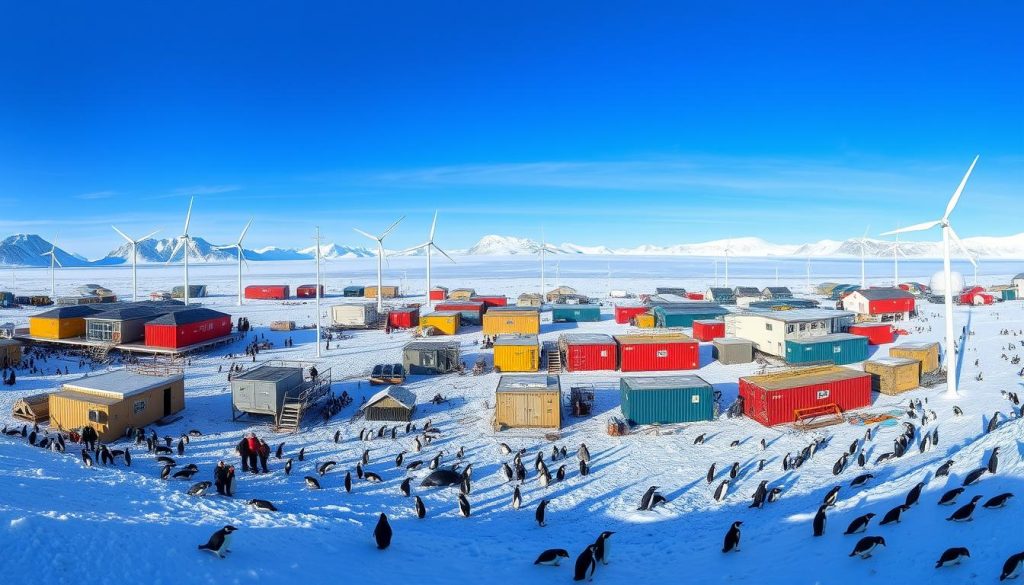Exploring climate change and saving the environment puts Antarctica in the spotlight for science. Businesses that help with Antarctic research are becoming crucial. They offer many chances for those wanting to make a difference. Providing research support, these ventures range from transport to supplying science gear. This piece looks at the variety in the Antarctic business world. It shows how these companies are key in supporting important studies.
Understanding Antarctic Research
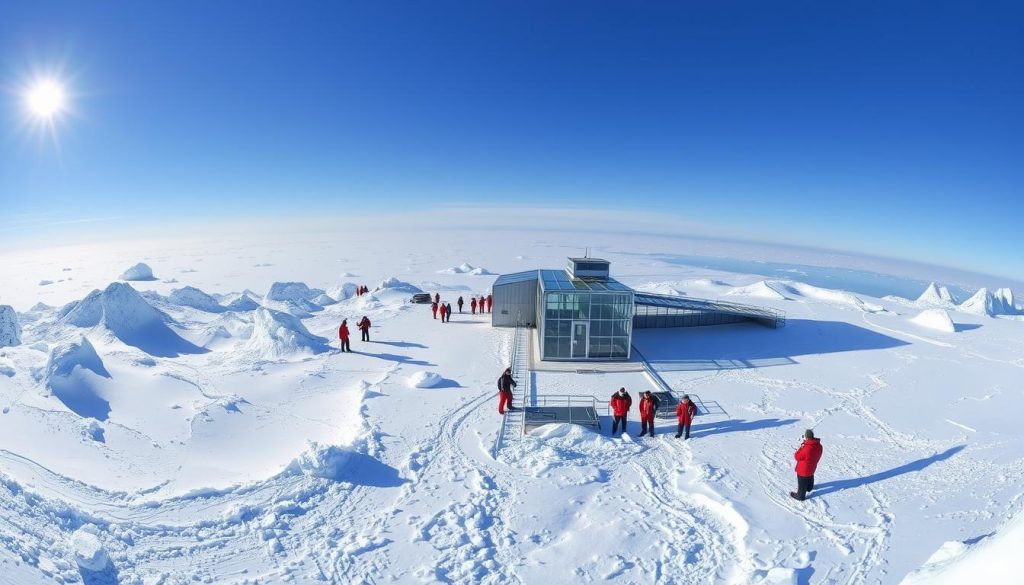
Antarctic research is key to learning about Earth’s climate and ecosystems. This unique place serves as a perfect lab for scientific study. It offers clues about changes in the world’s climate and environmental sciences.
The harsh conditions in Antarctica are ideal for studying different fields like glaciology, marine biology, and climate science. Each of these fields helps us grasp important global changes.
Studies in this area aid in understanding climate change’s effects. The region’s vast ice sheets impact sea levels. When they melt, they provide essential data, showing why studies here are crucial. The British Antarctic Survey leads these efforts, working with teams from around the world. This underscores the teamwork needed in Antarctic research.
Fieldwork in Antarctica gives us valuable insights into ecosystems and species that survive harsh conditions. Combining these insights improves our knowledge of environmental science. It shows how Earth’s systems are linked.
The Importance of Research Support in Antarctica
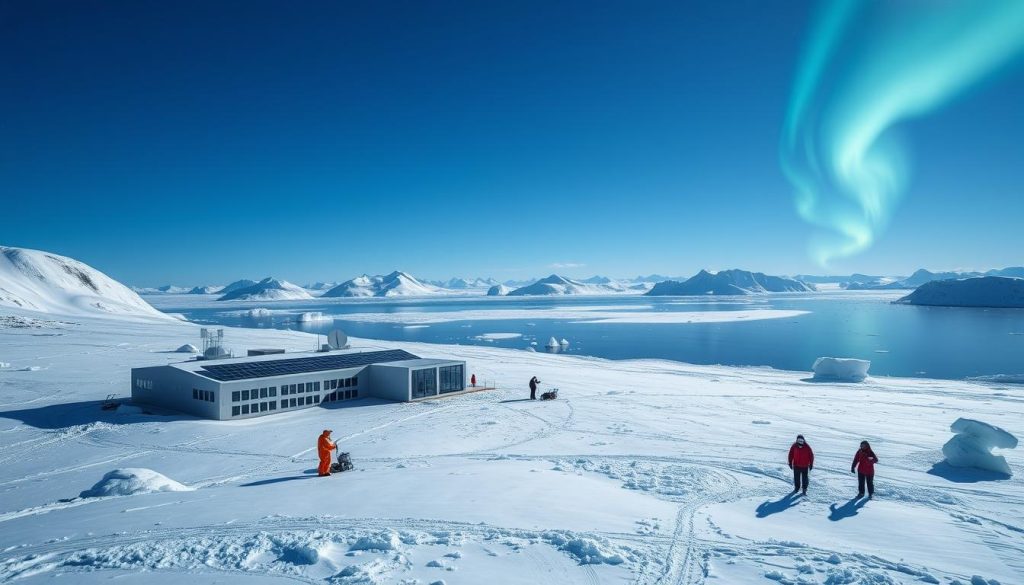
Research support in Antarctica is key for science work. The harsh conditions there need strong support. This lets researchers work well and safely.
Logistics are critical. It’s vital to get supplies, gear, and teams to locations on time. Transportation, supply management, and infrastructure are all crucial for various studies.
Scientific support is just as important. It provides special equipment and expert knowledge. This helps in collecting and analysing data, improving research results. Without good support, projects may face delays.
Strong infrastructure and reliable services are the backbone of successful research. They also create business chances as the need for support grows.
Research Support Business Opportunities in Antarctica
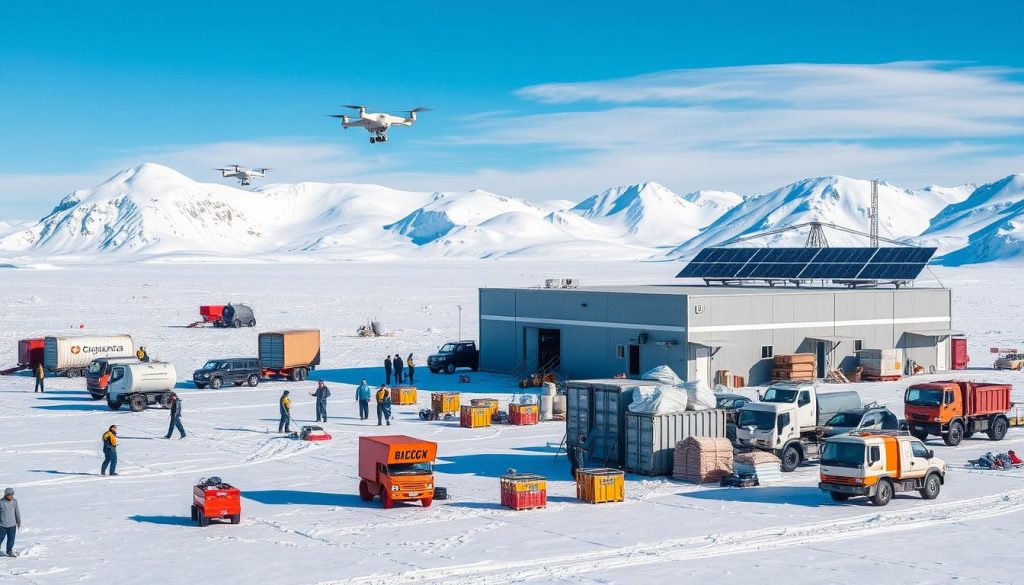
Antarctica is now a hotspot for business opportunities because of its key role in global research. With more interest in scientific studies, companies are offering needed research support. They provide logistics, equipment, and expert advice suited for Antarctic research needs.
Overview of Current Ventures
Many companies are playing a big part in Antarctic research by providing specialized services. Here’s what’s on offer:
- Logistics providers that make sure people and gear safely reach remote spots.
- Firms that give scientists the tools and tech they need for their work.
- Consultants with know-how in environmental science and analyzing data.
These businesses meet the vital needs of researchers in a tough environment. Their services help improve research and boost the local economy too.
Emerging Markets in Antarctic Research
New business chances are popping up in Antarctic research, especially with the increasing concern over climate change. Some sectors set to grow include:
- Environmental monitoring to watch over ecosystem shifts.
- Renewable energy to make research less harmful to the environment.
- Eco-tourism that encourages sustainable ways to see Antarctica and supports research.
These fields show the variety of new ventures and stress on doing research the right way in sensitive places. Leaders in these areas help push science forward and find ways to make money responsibly. Knowing these markets helps investors and business people find their way in the Antarctic research support scene.
Key Players in Antarctic Research
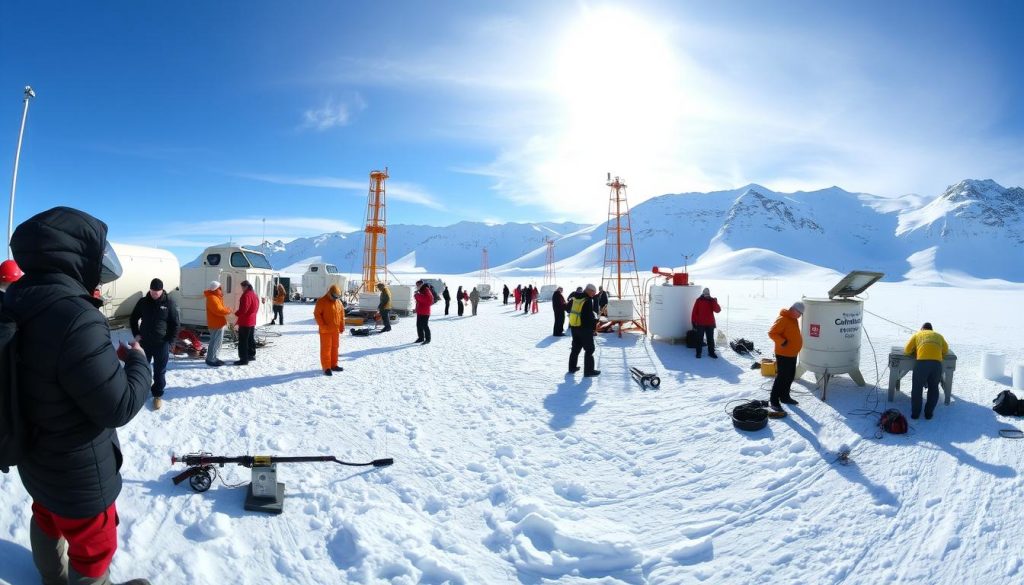
Antarctic research brings together many important groups. They are crucial for continuing and advancing science on the continent. These groups include various Antarctic research organisations, governments, and private companies. They all work together to learn more about this unique area.
The British Antarctic Survey is a leading body in polar science. It has a rich history of exploration and study. In the USA, the National Science Foundation has a vital role too. It funds and supports scientific projects in Antarctica. This helps scientists collect important data.
Big companies also play a significant role in Antarctic research. They provide essential support like logistics, technical know-how, and equipment. This support boosts the work of researchers. It lets them carry out wider and deeper studies.
- British Antarctic Survey
- National Science Foundation
- Leading private companies specializing in research support
When these key players work together, they create a powerful team for scientific discovery. They combine forces between research organisations and top companies. This teamwork is vital for exploring Antarctic secrets. It also helps in promoting sustainability and tackling global environmental issues.
Types of Support Services Needed
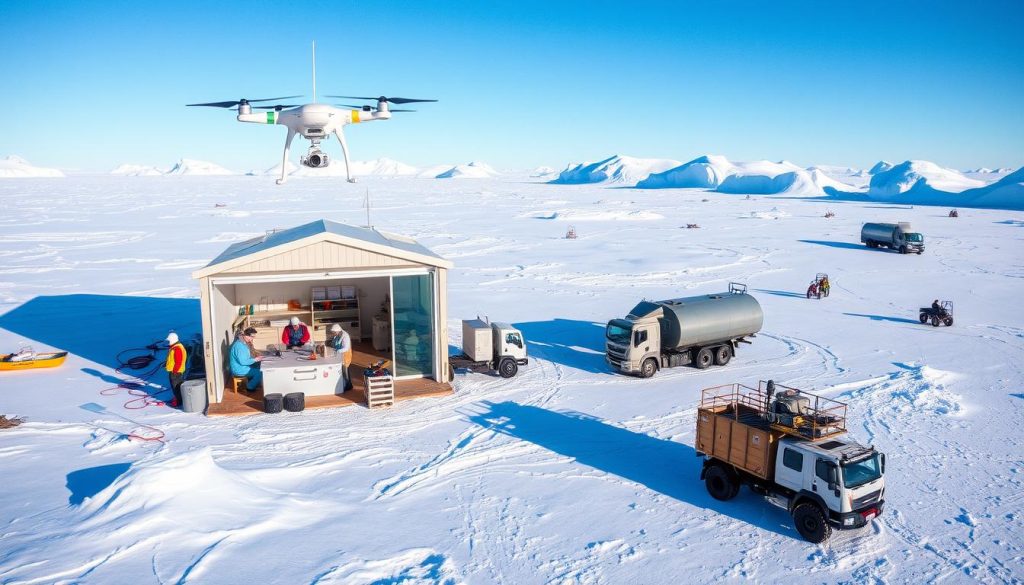
In Antarctic research, various support services are key for success. They help tackle the harsh environment and the complex tasks of doing science in a remote place.
Logistical Support
Logistical support ensures research missions run smoothly. It provides services such as:
- Transportation of personnel and equipment to research sites
- Facilities management to ensure the functionality of research stations
- Camp setup and maintenance to provide a safe working environment
Scientific Equipment Provision
Getting the right scientific equipment is critical for field research. We need specific types of gear, including:
- Remote sensing instruments for environmental monitoring
- Sample collection tools customised for polar conditions
- Data logging equipment to ensure accurate data capture
Technical Expertise and Consulting
Having access to technical expertise and consulting helps with planning and carrying out projects. Experts offer insights that help with:
- The development of research methodologies
- Data analysis and interpretation
- Risk management strategies to mitigate potential challenges
Regulatory Environment for Business Ventures
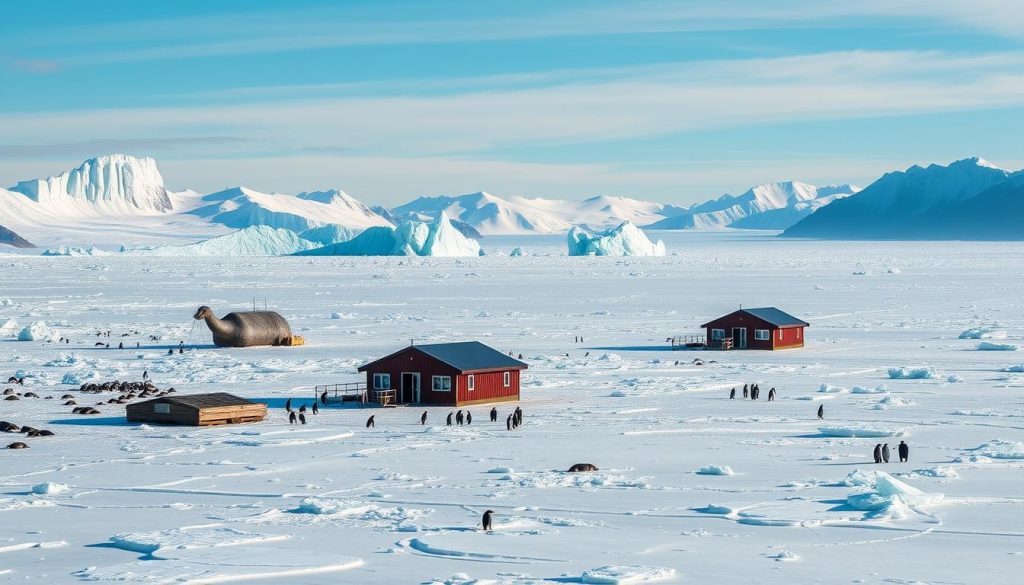
The rules for businesses in Antarctica are governed by a complex system. This system is crucial for protecting the unique environment. The Antarctic Treaty System plays a key role. It handles territorial claims and supports science while making sure human actions are eco-friendly.
If you want to do business in Antarctica, following these rules is a must. Before starting, you need to check how your business might affect nature. This step is crucial to make sure you follow all Antarctic rules.
Applying for permission involves various steps. Businesses need to get the green light from their own governments. These governments are part of the Treaty. A lot of paperwork and a promise to follow eco-friendly methods are involved.
But getting permission is just the beginning. You must keep following the eco rules. This means your business may need to update its practices to stay in line with the Treaty. Anyone looking to work in Antarctica must understand these regulations well.
Challenges Faced by Businesses in Antarctica
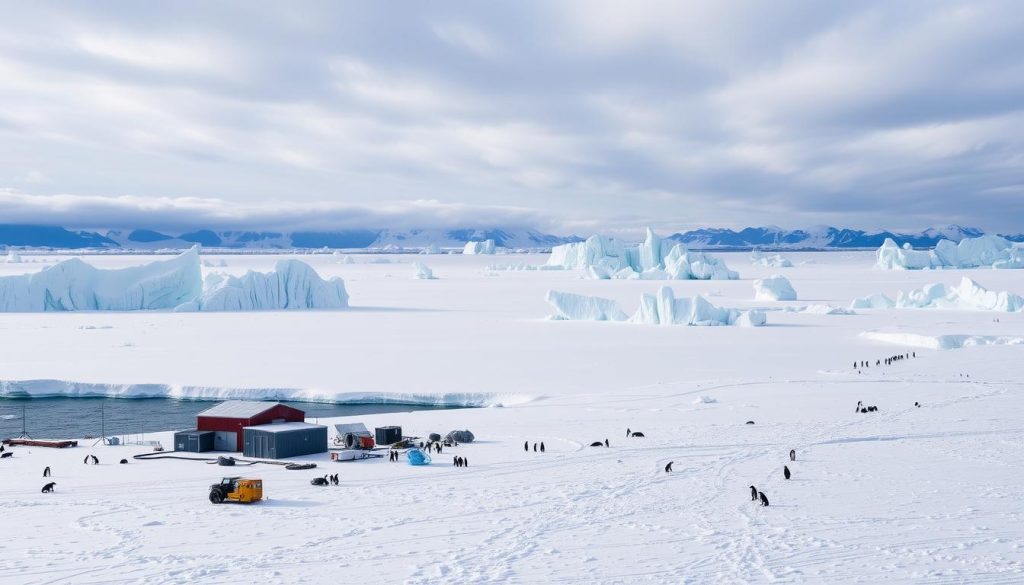
Running a business in Antarctica is tough due to harsh weather and strict rules. These conditions make business operations risky and complex. Organizations must grasp these challenges to thrive in such an extreme place.
Harsh Environmental Conditions
Businesses here battle extreme cold and strong winds. These issues include:
- Limited access to vital resources.
- Long delivery times for supplies.
- Electricity problems from bad weather.
These conditions affect business efficiency. This makes it vital for companies to plan well and build strong supply systems.
Regulatory Compliance Issues
Firms also deal with tough regulations. Knowing and following laws and treaties is essential. Issues involve:
- Rules to protect Antarctica’s delicate environment.
- Permit requirements slowing down projects.
- Demands to report activities to authorities.
Understanding these rules helps businesses avoid fines and keep their permits. To succeed, businesses must meet high standards for environment and legal issues.
Future Trends in Antarctic Research Support
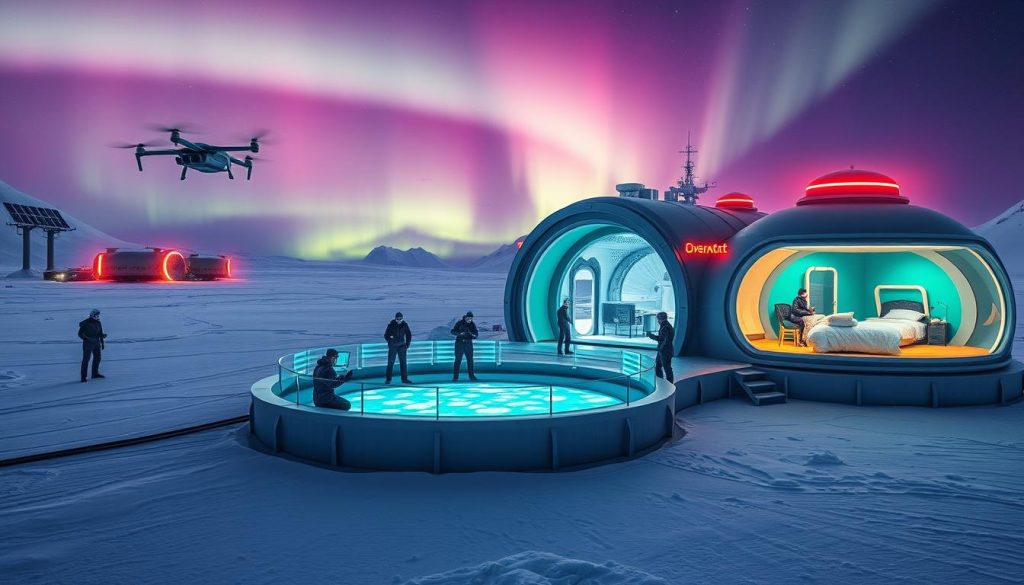
Antarctic research is gearing up for big changes due to climate change and new technology. As we all try to tackle environmental issues, research in Antarctica will focus on being green and working together. This brings exciting chances for businesses.
The role of new technology is huge here. Thanks to advances in remote sensing, data collection in Antarctica will get easier. This means better research and smoother operations, which changes how support services work.
- Increased international collaboration among research institutions.
- Growing demand for sustainable support services and practices.
- Emphasis on data-driven decision-making in evolving markets.
- Emerging fields such as marine biology and glaciology gaining traction.
Antarctic research is stepping into a future with innovative support setups. Businesses in tune with these shifts will gain an edge. They’ll better navigate the changing research landscape in Antarctica.
Identifying Your Niche in the Antarctic Market
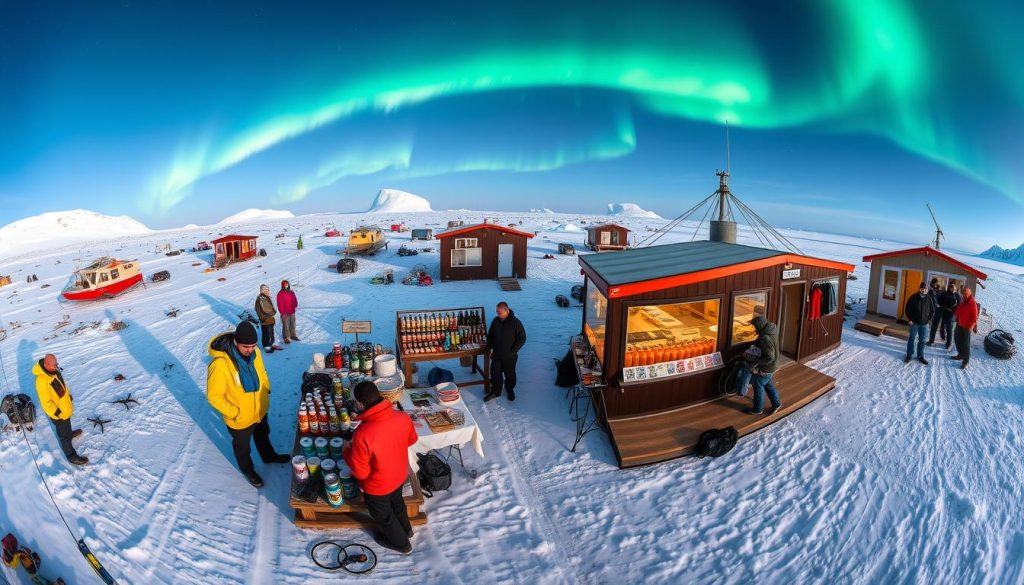
Finding a special niche in the Antarctic market means really knowing the different areas of Antarctic business. Entrepreneurs should first look at what services are already out there. This helps them find spaces where their businesses can grow. Looking for these special markets can lead to business success.
One good strategy is to look closely at what Antarctic research needs. For example, research might need certain logistic support, special scientific gear, or specific technical skills. By spotting these unique needs, companies can offer services that research teams in Antarctica are looking for.
- Conduct market research to identify needs for specific services.
- Engage with researchers to understand their challenges and requirements.
- Explore emerging trends in Antarctic research to anticipate future demands.
Also, looking at what other companies offer can give clues about what makes a business succeed. Knowing what others do well and not so well helps newcomers create extra-valuable services that stand out.
In the end, finding and understanding niche markets in Antarctic research support is crucial. It helps businesses start up and place themselves well to meet the unique needs of this field.
Networking and Collaboration Opportunities
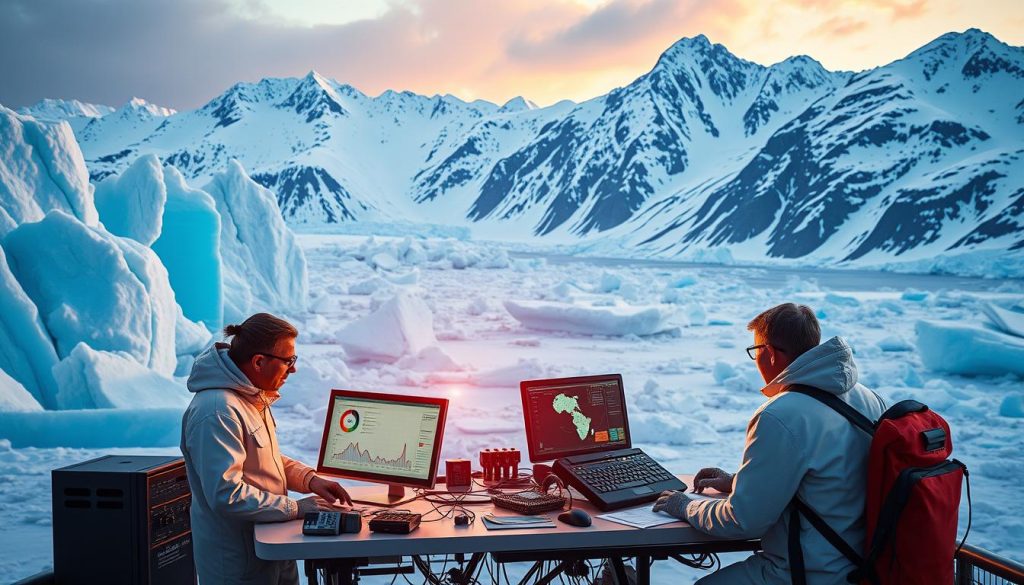
Building strong networks is key for those who want to shine in Antarctic research. By teaming up with research institutions, businesses can do more and make a big impact. Talking and working with different groups opens doors to new ideas and shares important resources.
Partnerships with Research Institutions
Working with top research groups can greatly increase your work’s impact in Antarctic studies. These partnerships bring you closer to the latest technology, vast data, and experts. Key steps to forming partnerships include:
- Finding research groups that share your goals.
- Going to events to meet new people to work with.
- Working together on research to build stronger connections.
- Looking for funding together for your projects.
These strong bonds not only boost your ability to do research but also improve how others see your work. Working together leads to more creativity and better results in studying Antarctica.
Investment Opportunities and Funding Sources
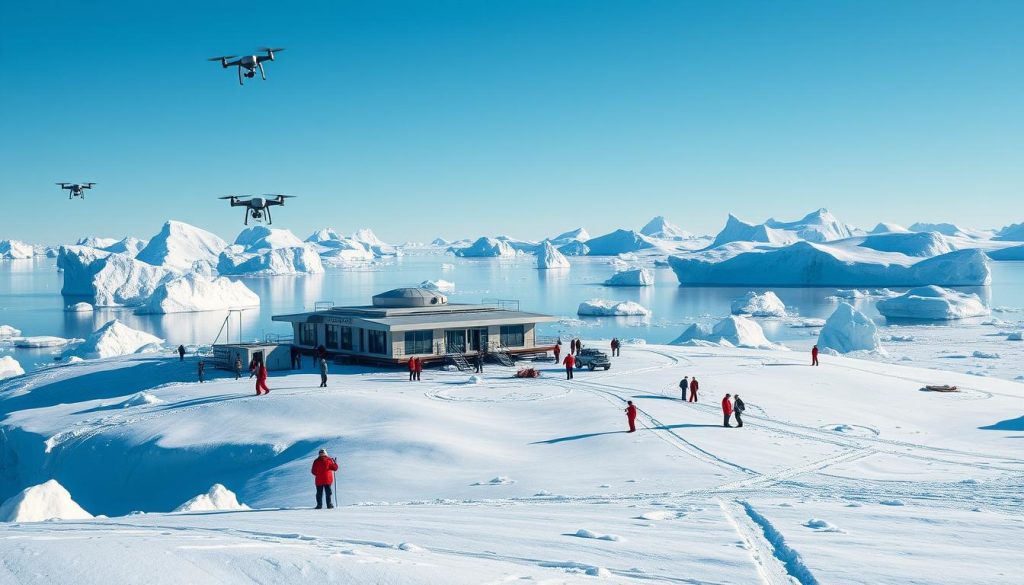
Now more than ever, pouring funds into research is crucial. This is especially true when we talk about projects in Antarctica. Several sources are available for firms wanting to support science in this special place. These opportunities come from many places, like government grants, private backers, and global groups focused on the climate and saving the environment.
For those looking to find funds, here are some options:
- Government grants help by providing money for science-boosting projects.
- Private investors want in, drawn by new and sustainable ideas.
- Global organisations have special programs for Antarctic work and collaborative efforts.
To get funding, understanding how to apply is key. Companies need to show how their projects will help Antarctic research aims. They must make their case by highlighting the science behind their plan, its benefits for the environment, and any fresh ideas they bring. Doing this can greatly increase their chances of getting the needed funds.
Marketing Strategies for Antarctic Business Ventures
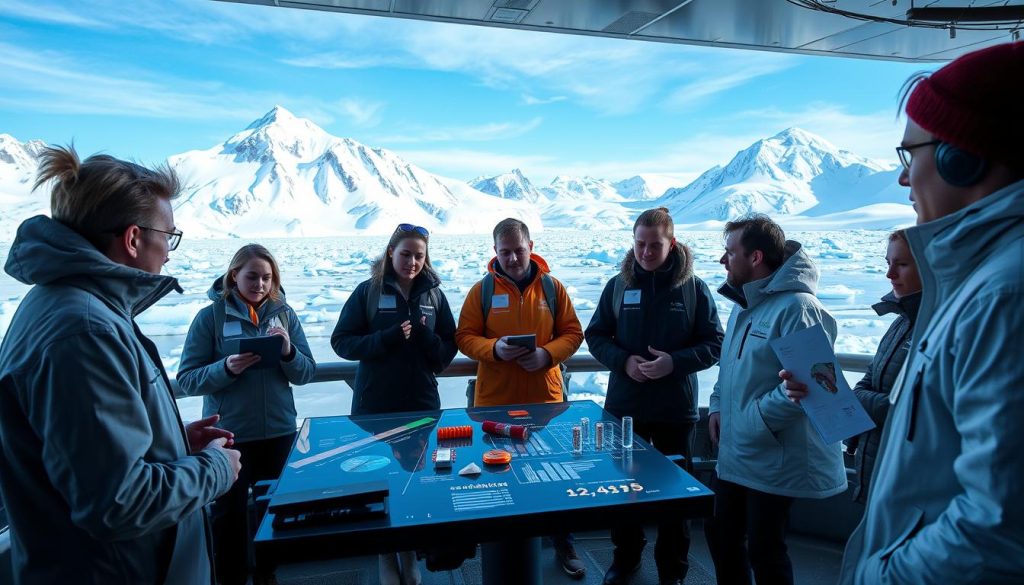
To thrive in the Antarctic market, you need smart marketing strategies. They must address both the challenges and opportunities in this unique environment. Having a strong online presence is crucial. A top-quality website that displays your services can draw in potential partners and clients. This makes sure people can find your brand easily.
Using social media is another key strategy. It lets you connect with your audience by sharing targeted content. This engagement helps build relationships, especially within the scientific and research communities. Keeping your network updated with news on projects and discoveries keeps them interested.
Attending industry conferences is a great chance to present what you offer directly to potential clients. These events are perfect for networking. They allow you to meet important people and discuss the latest Antarctic market trends. Showing off your knowledge and establishing a strong reputation is essential in a competitive field.
Finally, never underestimate the power of testimonials and case studies. They prove your success and reliability. Sharing stories of successful projects and partnerships can attract new opportunities. It shows you’re a trusted partner in the Antarctic research support field.
Success Stories of Antarctic Support Businesses
The Antarctic is home to some amazing business success stories. A logistics company achieved great things by creating unique ways to send supplies to far-flung research stations. They used smart tracking technology and worked closely with local authorities. Their work shows us all how to overcome big challenges in such a harsh environment.
Another story is about a company that supplies the latest scientific gear to researchers. They make sure they understand what scientists need. Then they provide exactly that. This close cooperation with research teams made them a favourite source for cutting-edge tools. The relationships they’ve built and the improvements in research quality are noteworthy.
These stories are shining examples for anyone wanting to get into the Antarctic market. They show that with creative thinking and strong teamwork, success is within reach. Their journeys encourage new entrepreneurs to come up with fresh ideas. This is vital for the ongoing support of Antarctic research.

